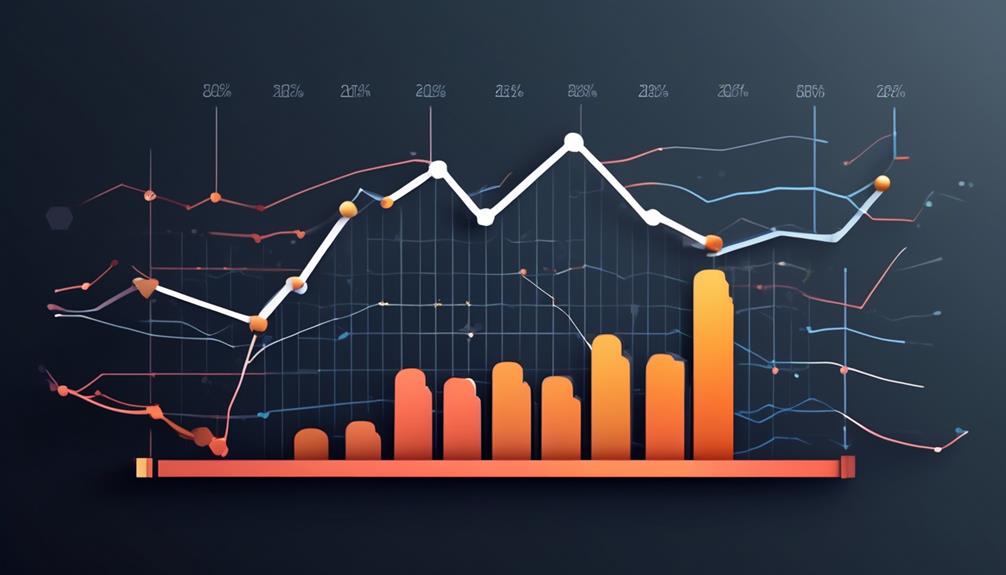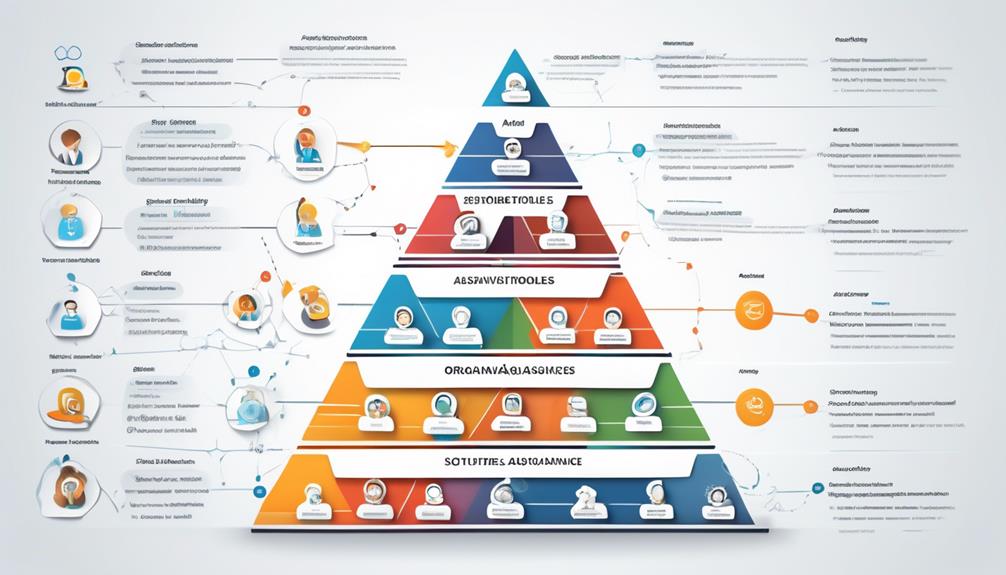Have you ever considered how software quality assurance evolves to keep pace with the rapidly changing technology industry?
As technology continues to advance, so do the trends in software quality assurance. From emerging automation technologies to the growing significance of performance testing, there are several key areas that are shaping the future of software quality assurance.
Let’s explore the latest trends and their impact on ensuring the high quality and reliability of software products.
Key Takeaways
- Integration of AI and machine learning in automation testing
- Importance of security testing for mitigating cybersecurity risks
- Impact of artificial intelligence in enhancing test automation and improving accuracy of test results
- Growing significance of performance testing for comprehensive evaluation of system capabilities and enhanced customer experience
Emerging Automation Technologies
We’ve observed a significant integration of AI and machine learning within emerging automation technologies, enhancing their testing capabilities. This integration is revolutionizing the role of AI in software testing, as it enables advanced functionalities such as AI-driven test data generation and analysis. These capabilities are crucial in ensuring the quality of digital products and applications. The incorporation of AI in automation testing is a pivotal development in software quality assurance trends, as it empowers organizations to ensure the reliability and robustness of their software products in the digital landscape.
Furthermore, the emergence of new tools in test automation is reshaping the landscape of software development. The focus on autonomous testing and the utilization of low code no code automation platforms are indicative of a shift toward minimizing human intervention in the testing process. This not only enhances efficiency but also broadens the scope of individuals who can actively participate in the automation testing process.
Additionally, the mandatory periodic quality updates imposed by vendors are playing a significant role in ensuring the continual improvement of automation technologies. These updates are instrumental in maintaining high software quality standards and aligning with the ever-evolving demands of the digital market.
Importance of Security Testing

Security testing has become a critical component in ensuring the resilience and integrity of software applications in the face of escalating cybersecurity threats. As part of the current software quality assurance trends, the importance of security testing can’t be overstated. Here’s why:
- Mitigating Cybersecurity Risks: Security testing is essential for identifying and mitigating cybersecurity risks in software applications. With the increasing number and complexity of cyber threats, robust security testing is crucial to safeguard sensitive data and protect against potential breaches.
- Compliance Testing and Data Protection: It involves vulnerability assessment, penetration testing, and compliance testing to ensure data protection regulations are met. Adhering to data protection regulations isn’t only a legal requirement but also vital for maintaining customer trust and confidence.
- Preventing Security Breaches: Security testing helps in preventing security breaches and ensuring the reliability and trustworthiness of web and mobile applications. As applications become more interconnected through the Internet of Things (IoT), the need for thorough security testing becomes even more critical to prevent vulnerabilities from being exploited.
Incorporating security testing into the software development lifecycle, leveraging automation and Artificial Intelligence (AI) for testing, and integrating it seamlessly with agile and DevOps practices are pivotal to ensuring the overall quality and security of software applications in today’s digital landscape.
Impact of Artificial Intelligence
Artificial Intelligence is revolutionizing the landscape of software quality assurance by enhancing test automation and improving the accuracy and reliability of test results. The integration of AI and machine learning in automation testing tools is significantly enhancing test coverage and scalability.
AI is playing a pivotal role in empowering organizations to deliver quality software by assisting in intelligent test scoping, test case generation, self-healing, and predictive testing. This technological advancement not only ensures higher quality products but also contributes to customer satisfaction.
It’s noteworthy that the use of AI in quality assurance is expected to increase, with 77% of organizations consistently investing in AI for optimizing QA processes. Moreover, the concept of autonomous testing, where no human intervention is needed, is a future goal leveraging AI, creating a digital immune system for software quality.
Growing Significance of Performance Testing

The growing significance of performance testing in today’s software development landscape is underscored by its critical role in ensuring application performance under varying loads. This emerging trend is shaping the way software testing is conducted, as it plays a pivotal role in addressing performance issues and ensuring operational efficiency.
Here are three key aspects that highlight the growing importance of performance testing:
- Comprehensive Evaluation: Performance testing, including stress testing and load testing, allows for a comprehensive evaluation of the system’s capabilities under various conditions, ensuring that it can handle peak performance scenarios and effectively manage increasing user traffic.
- Scalability Testing: With digital transformation driving the demand for scalable applications, performance testing has become essential for assessing scalability, enabling software to handle growing user loads without compromising performance.
- Enhanced Customer Experience: In the realm of business-critical mobile and web applications, performance testing is crucial for delivering a superior customer experience, thereby emphasizing its indispensable role in the software testing process.
The integration of performance testing tools, such as JMeter and LoadRunner, further enhances the efficacy of performance testing, both in automated and manual testing scenarios, thereby contributing to the overall quality of software development.
Integration of Tools and Activities
In today’s dynamic software development landscape, the integration of testing tools and activities is a pivotal aspect of ensuring efficient and comprehensive quality assurance processes. Seamless collaboration between different testing tools and activities is essential to ensure a more holistic approach to quality assurance.
The latest trends in software quality assurance emphasize the integration of various testing activities to ensure seamless and rapid testing processes. Integration plays an essential role in the QA landscape, as it allows for better tracking and management of testing efforts.
Moreover, process automation, enabled by advanced technologies, can be integrated with different testing tools to streamline processes and improve overall efficiency. This integration not only reduces the likelihood of software failures but also enables the generation of more accurate and actionable testing reports, providing valuable insights for continuous improvement.
As the software development industry continues to evolve, the integration of testing tools and activities remains a critical focus area in ensuring the delivery of high-quality, reliable software products.
Frequently Asked Questions
What Is Software Quality Assurance in Recent Trends in It?
In recent trends, we see a significant shift towards automation testing, agile and DevOps methodologies, mobile and IoT testing, and the integration of AI in testing processes. These trends emphasize enhanced test coverage, continuous testing, collaboration between teams, addressing diverse device and OS fragmentation, and dealing with complex IoT ecosystems and real-time data processing.
The focus is on improving efficiency, scalability, and early defect detection in software quality assurance.
What Is the Future of Quality Assurance?
In the future, quality assurance will continue to evolve with the increasing adoption of automation testing, AI, and machine learning for improved accuracy and scalability.
Agile and DevOps methodologies will drive continuous testing and integration, enhancing collaboration between development and testing teams.
Mobile testing will be crucial due to diverse device and OS fragmentation, while IoT testing will focus on interoperability and security.
AI will further revolutionize test case generation, predictive analytics, and automation.
Is QA Still in Demand?
Yes, QA is still in high demand. The increase in automation testing, Agile and DevOps practices, and the demand for mobile and IoT testing all contribute to its ongoing relevance.
Additionally, the integration of AI in testing processes, such as predictive analytics and autonomous testing, highlights the need for QA expertise.
Organizations continue to invest in digital immunity, emphasizing the crucial role of QA in boosting system resilience and ensuring customer satisfaction.
What Is the Next Big Thing in Testing?
We’re witnessing a significant shift in testing methods, with AI-powered test case generation, predictive analytics, and cloud testing gaining momentum.
The emphasis on security testing, particularly cybersecurity and compliance testing, is also on the rise.
Continuous testing, integrating automation and collaboration, is becoming a standard practice.
These trends are shaping the future of testing, offering enhanced efficiency, scalability, and security in the software development lifecycle.
Conclusion
In conclusion, as we’ve explored the software quality assurance trends, it’s evident that integration testing plays a crucial role in ensuring the functionality and reliability of complex software systems.
With the emergence of automation technologies, the growing significance of performance testing, and the integration of tools and activities, it’s clear that the future of software quality assurance lies in leveraging these trends to improve efficiency and effectiveness in the development and testing process.









